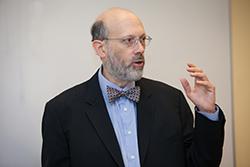How Church and State Became Separated
Columbia Law School Professor Philip Hamburger Explores the Complex History of an American Sacrament -- Including the Forgotten Role of the Ku Klux Klan.
New York, October 2, 2013—The phrase “separation of church and state” has become almost sacrosanct in American life, but many people do not know that the idea was popularized by nativist and white supremacy groups like the Ku Klux Klan (KKK), said Columbia Law School
| Professor Philip Hamburger |
Professor Philip Hamburger in a provocative Sept. 27 talk presented by the Institute for Religion, Culture, and Public Life (IRCPL) at Columbia University.
Hamburger, a constitutional scholar and legal historian, said many Americans assume “separation of church and state” is a constitutional principle. But the phrase began as an establishment accusation against dissenters rather than as a dissenting demand, and it first became part of American popular politics in 1800 during the election of Thomas Jefferson, years after the First Amendment had been carefully drafted to balance different complex points of view. Beginning in the 1840s, nativists became leading advocates for the separation of church and state because they were suspicious of the power and dogma of the Catholic Church, and they sought to separate the Church from American government. The idea of “separation” had been encouraged in the early 19th century by various groups, but it didn’t make much popular headway until nativist groups espoused it. The KKK of the 1920s was one of these nativist organizations, and it pursued this nativist agenda.
Hamburger, the Maurice and Hilda Friedman Professor of Law and author of the book Separation of Church and State, explained that the KKK of the 1920s was a fraternal organization that included many Protestant men and women who supported progressive ideas despite their calls for white supremacy. Many Klan members felt that public schools and a free press, for instance, would encourage independent thinking—especially an independence from church doctrines—and supported the separation of church and state out of fear that ecclesiastical authority was undermining individual mental freedom and thereby also the foundations of free government.
| Attendees posed questions to Professor Hamburger following his presentation. |
“Ideas have baggage, much like physical objects,” Hamburger said. In particular, phrases “can have tendencies you may like or not like, but that you should be aware of.”
Hamburger’s talk was part of the IRCPL’s Religion and Politics in American Public Life lecture series, and co-sponsored by the Department of Political Science at Columbia University and the Department of Sociology at the CUNY Graduate Center.

